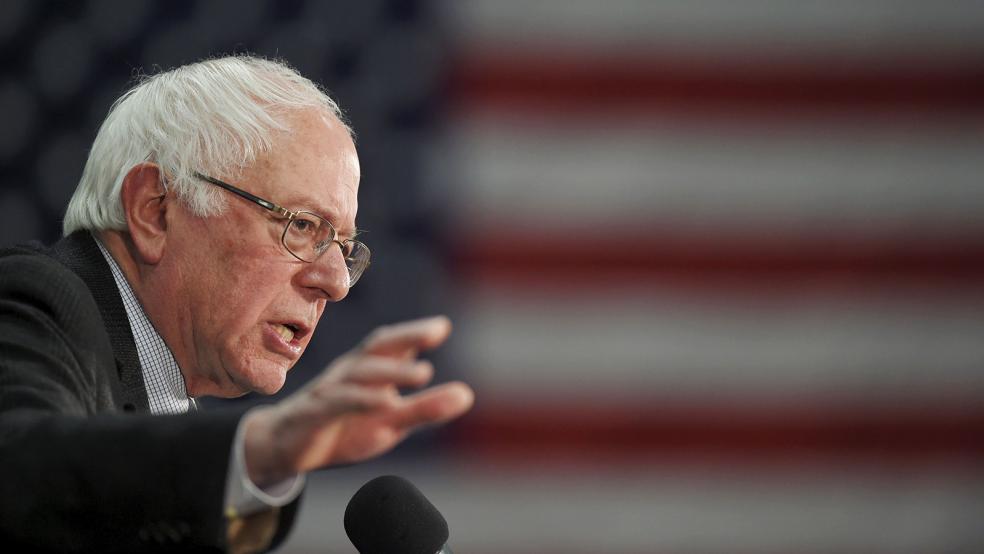Wrapping up an interview with MSNBC’s Thomas Roberts on Wednesday, Republican presidential frontrunner Donald Trump sent his “warmest regards” to Sen. Bernie Sanders of Vermont, who was scheduled to appear later in the program.
Trump, a master of political theater, seems to be savoring the implications for later this fall of a startling turn of events in the Democratic presidential race that has thrust Sanders ahead of Hillary Rodham Clinton in Iowa and New Hampshire while shrinking Clinton’s once sizable lead in the national polls.
Related: Bernie Sanders Tells Vermont Voters: Trump Is a Pathological Liar
Of course it’s too soon to predict whether Sanders’ campaign surge is a sign of things to come or a temporary boom that will fade as the campaign moves beyond Iowa and New Hampshire to southern and western regions less hospitable to the independent Vermont senator.
But it’s no longer possible to dismiss out of hand the possibility of a general election campaign pitting Sanders -- a self-styled democratic socialist who champions the middle class and despises Wall Street – against Trump, a hard edged capitalist who favors tax cuts for the rich, deporting 11.3 million illegal immigrants from the country and temporarily barring Muslim from entering the U.S.
Trump holds a commanding two to one lead over his nearest rivals in the national polls and is running far ahead in New Hampshire, home to the first primary of the political season. In Iowa, he’s gaining on Sen. Ted Cruz (R-TX) after raising doubts about Cruz’s eligibility to serve as president.
Sanders, meanwhile, has pulled ahead of Clinton in Iowa and New Hampshire with his themes of income inequality and the excesses of the “billionaire class.” And now he now threatens to overtake the former secretary of state in the nationwide race.
Related: Clinton Facing a Long Fight as Sanders’ Fundraising Soars
As the Feb. 1 Iowa caucuses rapidly approaches, a newly released New York Times/CBS News poll shows that 48 percent of Democratic primary voters nationwide support Clinton, while 41 percent back Sanders.
Clinton is losing altitude rapidly. Only a month ago, she led Sanders nationally by 20 percentage points. The new poll suggests that her biggest problem may be a generational divide in which primary voters under the age of 45 favor Sanders by roughly two to one.
Meanwhile, two state polls released on Tuesday further highlight the Clinton’s challenge. A Quinnipiac University poll showed that Sanders has taken a slim lead over Clinton in Iowa, 49 percent to 44 percent, after Clinton had led for months. And a survey by Monmouth University gave Sanders a double-digit lead in New Hampshire.
The dramatic change in political fortunes has rattled Clinton’s campaign and prompted the former first lady to sharpen her attacks on Sanders – portraying him as weak on gun control, belittling his plan for a single-payer government health care system, and questioning whether he has the gumption to stand up to special interest groups, from the barons of Wall Street to the National Rifle Association.
Related: Trump vs. Obama: Smackdown over State of the Union
“If you’re going to go around saying you’ll stand up to special interests, well, stand up to the most powerful special interest – stand up to that gun lobby,” Clinton said in Ames, Iowa, referring to Sanders’s 2005 House vote to grant immunity to gun manufacturers from law suits related to shootings, according to The Washington Post.
Clinton insists that she’s not nervous about the latest turn of events, but thinks it’s time to move from introducing herself to voters in the early primary states to drawing sharp contrasts between her and Sanders.
During his appearance on MSNBC today, Sanders suggested that Clinton was getting desperate by distorting his record on guns and health care. At one point, he called her tactics on the gun control issue “mean spirited.”
Sanders cited recent polls showing that he would do better against Trump than Clinton in a general election campaign, and argued that he has already demonstrated the fundraising clout and crowd appeal to carry him to victory. Sanders and Clinton will square off again on Sunday during the final Democratic presidential debate before the Iowa caucuses.
“Not only do we have enough money to wage a very strong campaign in Iowa and New Hampshire, we’re working in Nevada, in South Carolina and in many other states as well,” Sanders said. “I think the American people are tired of establishment politics, establishment economics. They want to see leadership stand up to the billionaire class. Our message is resonating all across the country, and yes, we have the energy, we have the funding, to take this to the convention.”





